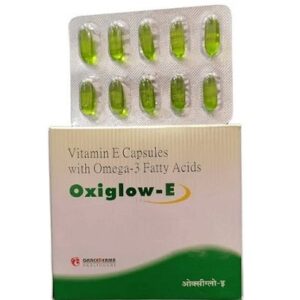VITAMIN E + OMEGA-3 FATTY ACIDS
Vitamin E: Vitamin E, also known as alpha-tocopherol, is a fat-soluble vitamin that plays a crucial role in maintaining the integrity of cell membranes and protecting cells from oxidative damage caused by free radicals. It is primarily used as a dietary supplement to help prevent or treat vitamin E deficiency.
Vitamin E functions as an antioxidant and scavenges free radicals, which helps protect cells and tissues from oxidative stress. It also plays a role in regulating immune function, gene expression, and blood clotting.
The recommended dietary allowance (RDA) for vitamin E varies depending on age and sex. For adults, the RDA is 15 mg (22.4 IU) per day. Higher doses may be used for specific medical conditions, such as vitamin E deficiency or certain neurological disorders.
While vitamin E is generally considered safe when taken at recommended doses, high doses above 400 IU per day can increase the risk of bleeding, especially in individuals taking blood-thinning medications. Other potential side effects of high-dose vitamin E supplementation include gastrointestinal disturbances, dizziness, headache, fatigue, blurred vision, and allergic reactions.
It is important to note that high-dose vitamin E supplementation has not been proven to provide significant benefits in preventing or treating conditions such as heart disease, cancer, or cognitive decline. Therefore, it is generally recommended to obtain vitamin E through a balanced diet that includes sources such as nuts, seeds, vegetable oils, and green leafy vegetables.
As with any medication or supplement, it is always advisable to consult with a healthcare professional before starting or changing the dose of vitamin E, especially if you have any underlying medical conditions or are taking other medications.
Omega-3 Fatty Acids: Omega-3 fatty acids are a type of polyunsaturated fat that are essential for overall health and well-being. They cannot be synthesized by the body and must be obtained through diet or supplementation. Omega-3 fatty acids are found in fatty fish like salmon, mackerel, and tuna, as well as in walnuts, flax seeds, and chia seeds.
The primary use of omega-3 fatty acids is to promote cardiovascular health. Several studies have shown that omega-3 fatty acids can lower triglyceride levels, reduce blood pressure, and decrease the risk of heart disease. They also have anti-inflammatory properties that can benefit conditions such as rheumatoid arthritis and inflammatory bowel disease.
The exact mechanism of action of omega-3 fatty acids is not completely understood. It is believed that they work by reducing inflammation throughout the body, decreasing the production of certain inflammatory molecules, and improving the function of cell membranes.
The recommended daily dose of omega-3 fatty acids varies depending on the specific needs of an individual. In general, it is recommended to consume at least 250-500 mg of EPA (eicosapentaenoic acid) and DHA (docosahexaenoic acid) per day. However, higher doses may be required for certain medical conditions, such as high triglyceride levels. Omega-3 fatty acids are available in various forms, including capsules, liquids, and fortified food products.
While omega-3 fatty acids are generally safe for most people, they may cause some side effects. The most common side effects include fishy burps, diarrhea, and an unpleasant aftertaste. These side effects can be minimized by taking the supplements with food or choosing enteric-coated capsules. Additionally, omega-3 fatty acids may interact with certain medications such as blood thinners, so it is important to consult a healthcare professional before starting any supplementation.

